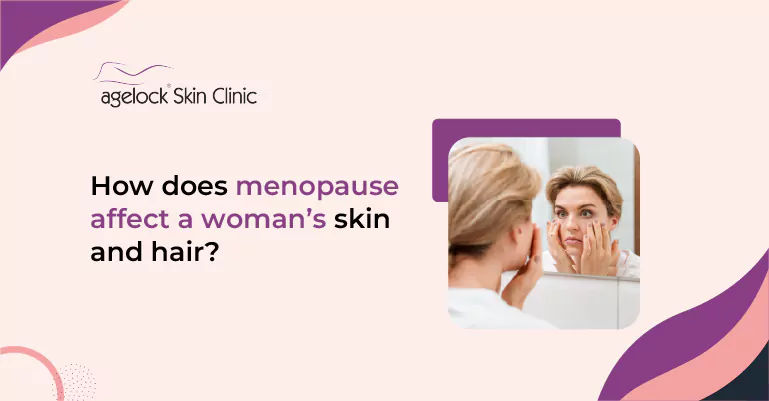How does menopause affect a woman’s skin and hair?
Menopause is the stage of every woman’s life that occurs when their ovaries stop producing estrogen and progesterone (the menstrual cycle stops).
These hormones play a crucial role in women’s bodies. During this menopause, they can experience some changes in their body, skin, and hair. In this blog article, you will know about what menopause is and how it affects women’s skin and hair.
What is menopause?
Menopause is a natural process that all women must go through at some point in their life which starts 12 months after their last period. This condition is identified when the woman has gone a year without having a menstrual period and has no other biological or physiological causes for amenorrhea. It can cause numerous changes to their skin, hair, and overall body.
The effects of menopause
When women enter menopause, their menstrual cycles stop, which means their childbearing years come to an end. Many people experience their first sign of perimenopause in their 40s. Also, it is possible to get some changes in their skin and hair earlier.
Some of the most significant changes people can expect in their skin and hair include the following:
1) Sagging skin and loss of plumpness
Collagen is an essential protein for holding our skin tissues together. When estrogen decreases, our skin collagen production also decreases. This means the skin is losing its elasticity and tightness. Thereby the skin becomes thinner and bruises more easily.
2) Itchiness and dryness or flakiness
You may experience dryness and itchiness on your skin during this menopause period. However, you can manage this problem with a good home skincare routine.
The most recommended tips for managing these issues are the following:
- Clean your skin gently daily to remove makeup and dirt.
- Applying a moisturizer every day is essential to keep your skin hydrated.
- Avoid using harsh and irritating products.
- Avoid taking a shower in hot water. Take warm water because a hot shower makes your skin dry by stripping its natural oil.
If you have redness or rashes on your skin, you should consult a dermatologist. They can help you find issues like eczema, rosacea, or any other allergic reactions.
3) Dark spots
Sometimes you may get pesky dark marks called age spots which often appear after menopause. They can be difficult to remove from home remedies. They might not respond to over-the-counter-products or home remedies. In such cases, your dentist may recommend prescription creams, office facial peels, or laser treatments.
4) Unwanted facial hair
As changes in hormones occur, you might notice the hair on your chin or upper lip. You can get rid of them by using some methods like waxing, tweezing, threading, and hair removal creams until they grow back.
5) Acne breakouts
Most women develop teenager-like acne as their hormone levels decrease. Some of them develop acne throughout their lives, while others develop it in the menopause period. Don’t use harsh chemicals or products to get rid of them. Try a gentle cleanser with salicylic acid. If nothing works, visit your dermatologist.
6) Hair loss and hair thinning
Estrogen is an essential hormone for hair growth, density, and its fullness. During this menopause period, people may notice their hair losing, shedding, and becoming thinner.
Preventions to minimize these hair and skin changes
- Your diet plays an important role in your hair and skin during menopause. Adding plant-based estrogen in your diet from some foods like nuts, fruits, beans, and seeds can help you regain lost estrogen during this condition.
- Also, adding foods with healthy fats and omega-3 fatty acids can help improve your skin quality and moisture.
- Taking some essential nutrient supplements for hair and skin while menopause helps balance your hormones and improves the health of your hair and skin.
- Applying sunscreen is the most important thing when you are inside as well. It can help you prevent the signs of aging and skin cancer.
- Always keep in mind that choosing the right skincare and haircare products is the most important thing.
Bottom line
You may not like how your skin and hair change with aging and hormonal changes. However, you have the potential to maximize your health and well-being by eating good, healthy food, exercising regularly, quitting smoking, and visiting your doctor frequently. If you prioritize your health, you can definitely look your best, be healthy, and feel better.





